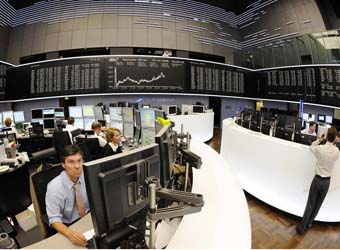Bourses in Europe closed mixed Friday after the U.S. fired cruise missiles against an air base in Syria, raising concerns over an escalating conflict in the region.
The FTSE 100 closed up 0.63 percent at 7,349, the French CAC rose 0.27 percent to 5,135, while the German DAX slipped 0.05 percent at 12,225. All the bourses were little changed for the week.
The pan-European Stoxx 600 was up 0.13 percent Friday, with most sectors trading in positive territory.
Oil and gas rose in reaction to the U.S. missile strike in Syria and closed the day up 0.6 percent. Brent closed the day up 0.55 percent, trading at $55.18 a barrel.
Basic resources stocks initially led the falls on Friday trading, following a decision from the European Union to raise import duties on Chinese steel, but also ended the day up 0.04 percent, scraping into positive territory.
On the other end of the spectrum were telecoms and insurance, which led the falls, down 0.43 percent and 0.31 percent respectively.
Meanwhile, U.S. stocks opened mostly flat Friday following the attacks and news that job growth missed expectations.
Nonfarm payrolls grew by 98,000 in March, well below the 180,000 anticipated, despite the unemployment rate falling to 4.5 percent.
Looking at individual European stocks, Standard Life and Aberdeen Asset Management were among the best-performing stocks following a ratings upgrade. Mediaset Espana, Spain’s largest television network, jumped 3.2 percent following an upgrade from JP Morgan during early trade before settling up 1.6 percent at the end of the day.
On the other end of the benchmark, Swedish packaging company BillerudKorsnas fell 4.7 percent by the end of Friday after a profit warning. Online retailer Ocado dropped 5.3 percent following a rating downgrade by UBS. Also, Vivendi’s shares closed slightly lower after the entertainment-to-telecoms conglomerate said it would pay $26.4 million to end a 15-year U.S. lawsuit over a big merger.
Investors were taking a defensive approach, opting for safe-haven, amid geopolitical volatility.
The yen was higher against the dollar and gold reached a five-month high. U.S. President Donald Trump said he ordered the strike against an airfield from which a deadly chemical attack took place earlier this week.
The Pentagon said in a statement that the U.S. informed Russian forces in advance of the strike.
Russia said the missile strike was “thoughtless” and called for an emergency meeting of the U.N. Security Council. Moscow also suspended a Syrian air cooperation agreement with Washington, which was put into place to avoid accidental conflict between the two nations’ warplanes.
The Russian dollar-denominated Micex stock index slid 2 percent and the ruble dropped 1 percent.
In Europe, the frontrunner to the French presidential election, Emmanuel Macron, said that there should be an international military intervention against the Syrian regime if it is proved that it is using chemical weapons.
The latest U.K. Halifax house price index showed a 3.8 percent increase on yearly figures in the three months to March. But the index remained unchanged on a monthly basis. This was the lowest price increase in nearly four years, Reuters reported.
In France, industrial production fell at its worst monthly pace in six months in February.
France’s month-on-month production fell by a surprise 1.6 per cent, with January’s figures also revised down to -0.5 percent from -0.2 percent. Industrial production accounts for just under 20 percent of the French economy.
Bank of England Governor Mark Carney said Friday that the central bank has asked all City firms to deliver their contingency planning over Brexit. In Sweden, one of the Riksbank’s deputy governors said the bank should start planning for how to deal with the end of its quantitative easing program.
Meanwhile, euro zone finance ministers agreed with the Greek government on a new reform package worth two percent of GDP to be implemented in 2019 and 2020.
Source: CNBC


